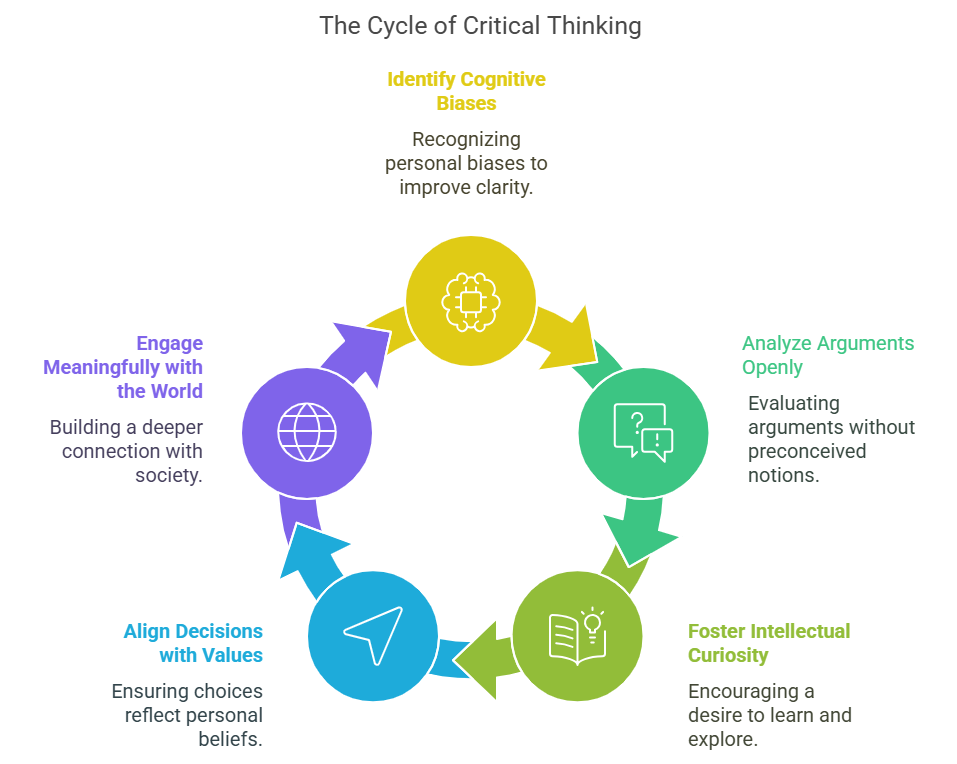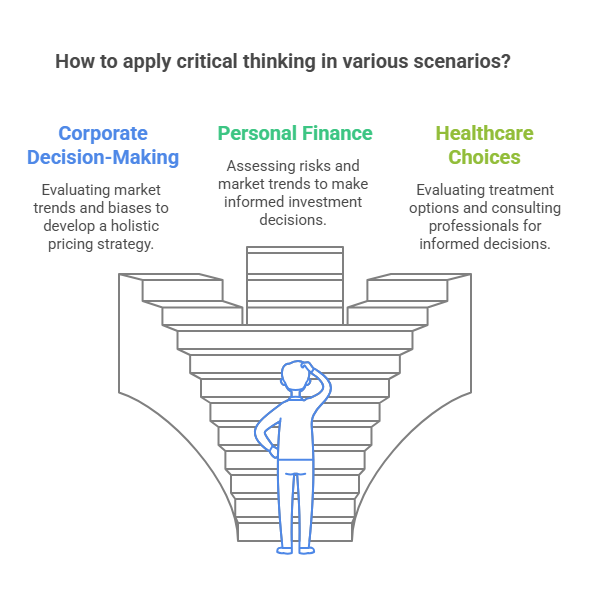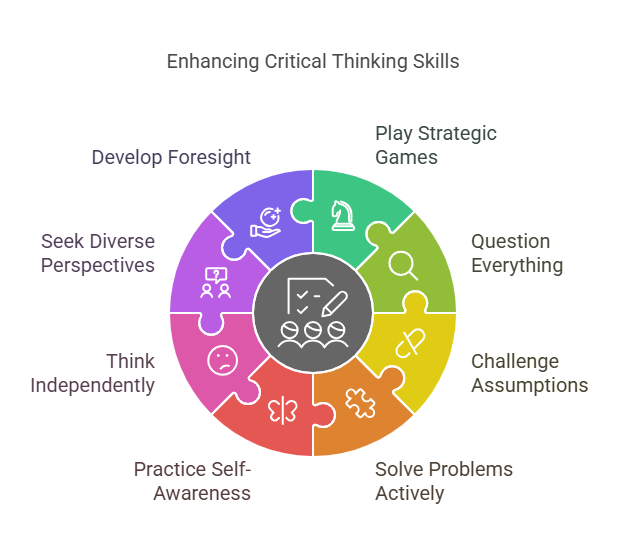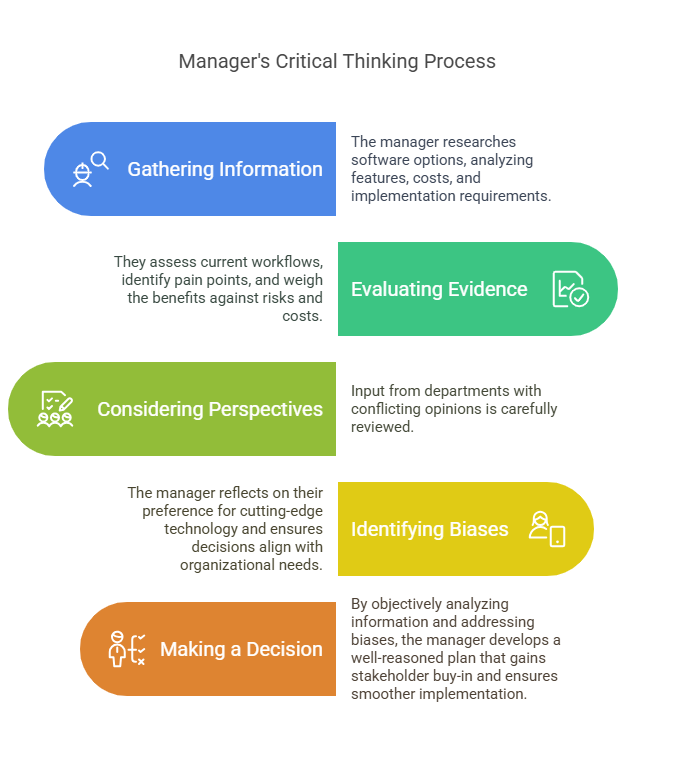In today’s fast-paced, information-saturated world, the ability to think critically has emerged as one of the most vital skills for personal and professional success. Whether you’re a student striving for academic excellence, a professional aiming to innovate in your field, or simply someone seeking to make better life decisions, mastering critical thinking can transform the way you approach challenges and opportunities. It empowers you to dissect information objectively, weigh evidence, and arrive at logical, well-informed conclusions.

Critical thinking is not just about solving problems—it’s about understanding the world more deeply, questioning assumptions, and making decisions that align with your values and goals. By identifying cognitive biases, analyzing arguments with an open mind, and fostering intellectual curiosity, you can elevate your problem-solving abilities and make choices that lead to meaningful outcomes.

This guide delves into the essence of critical thinking, its importance, the traits that define it, the skills it encompasses, and actionable strategies to sharpen your critical thinking abilities. Let’s embark on a journey to unlock the power of your mind.
What is Critical Thinking?
Critical thinking is the disciplined process of actively analyzing, evaluating, and synthesizing information to form a reasoned and objective judgment. It goes beyond passively accepting information at face value. Instead, it involves questioning, exploring, and understanding the context, implications, and ethical dimensions of the information you encounter.
At its core, critical thinking is a form of emotional intelligence. It requires self-awareness to recognize your own biases and assumptions, as well as the ability to approach problems with an open and inquisitive mind. It’s not just about what you think, but how you think.
Passive Thinking vs. Critical Thinking
- Passive Thinking: Accepts information without question, often leading to superficial understanding and uninformed decisions. It’s like skimming the surface of a lake without diving in to explore its depths.
- Critical Thinking: Dives deep into the information, uncovering connections, evaluating validity, and questioning assumptions. It’s akin to exploring the lake’s depths, discovering hidden treasures, and understanding its ecosystem.
Critical thinkers don’t settle for surface-level insights. They dig deeper to uncover the truth, enabling them to make better decisions and solve problems more effectively.

The Synergy of Critical and Creative Thinking
While critical thinking and creative thinking serve different purposes, they are complementary forces:
- Critical Thinking: Analytical and evaluative, focused on refining and improving ideas. It’s about asking, “Does this make sense? Is this the best approach?”
- Creative Thinking: Generative and exploratory, producing novel and innovative solutions. It’s about asking, “What if? How else can we approach this?”
Together, they form a powerful problem-solving duo. Creative thinking generates new ideas, and critical thinking refines and evaluates them for practical implementation. For example, a marketing team might brainstorm creative campaign ideas (creative thinking) and then critically assess which ideas align best with the brand’s goals and audience preferences (critical thinking).
Real-Life Examples of Critical Thinking
Critical thinking is not an abstract concept—it’s a practical skill that can be applied in everyday situations. Consider these examples:

- Corporate Decision-Making: A cross-functional team tasked with developing a pricing strategy must critically evaluate factors like market trends, customer behavior, and competitor actions. Team members from sales, marketing, and operations bring their own biases and assumptions. A critical thinker examines these assumptions, balances short-term gains with long-term customer loyalty, and arrives at a strategy that benefits the company holistically.
- Personal Finance: When deciding whether to invest in a new opportunity, a critical thinker evaluates the risks, researches market trends, and considers their financial goals rather than acting on impulse or hearsay.
- Healthcare Choices: A patient researching treatment options for a medical condition critically evaluates the credibility of sources, weighs the pros and cons of each option, and consults healthcare professionals to make an informed decision.
Why Are Critical Thinking Skills Important?
Critical thinking skills are a set of mental tools that enable you to navigate complexity, solve problems, and make informed decisions. They are essential for:

- Enhanced Problem-Solving: Breaking down complex problems into manageable parts, analyzing them systematically, and finding effective solutions.
- Improved Decision-Making: Evaluating information objectively to make rational, evidence-based decisions.
- Career Success: Employers highly value critical thinking for fostering innovation, increasing efficiency, and solving workplace challenges.
- Personal Growth: Promoting self-reflection, continuous learning, and adaptability in a rapidly changing world.
- Effective Communication: Articulating thoughts clearly, constructing compelling arguments, and engaging in meaningful discussions.
- Lifelong Learning: Encouraging curiosity and a drive for knowledge, leading to ongoing personal and professional development.
7 Traits of Critical Thinkers
Critical thinkers possess distinct characteristics that set them apart:

- Curiosity: A natural inclination to ask questions, explore evidence, and seek deeper understanding.
- Open-Mindedness: Receptiveness to different perspectives and willingness to change beliefs when presented with compelling evidence.
- Cognitive Flexibility: The ability to adapt thought processes, consider multiple viewpoints, and identify logical connections.
- Analytical Skills: Breaking down complex problems into smaller components and evaluating information systematically.
- Self-Awareness and Objectivity: Recognizing personal biases and striving to evaluate information objectively.
- Communication: Articulating complex ideas clearly and engaging in productive dialogue.
- Persistence: Commitment to finding the truth or best solution, even in the face of obstacles.
Key Critical Thinking Skills
To think critically, you need to develop and hone specific skills:

- Identifying Biases: Recognizing personal and external biases that influence judgment.
- Inference: Drawing logical conclusions based on available information.
- Research: Gathering accurate and relevant information to inform decisions.
- Identification: Recognizing problems and their underlying factors.
- Curiosity: Questioning assumptions and exploring new perspectives.
- Judging Relevance: Determining which information is most pertinent to the task at hand.
- Analysis: Breaking down complex information into smaller parts for examination.
- Evaluation: Assessing the credibility of sources and the validity of arguments.
- Self-Regulation: Monitoring your own thought processes to identify biases.
- Communication: Clearly expressing ideas and defending conclusions.
- Reflection: Reviewing decisions and learning from past experiences.
How to Develop Critical Thinking Skills: 13 Actionable Strategies
Ready to sharpen your critical thinking skills? Here are 13 practical techniques to get started:

- Play Strategic Games: Engage in games like chess, sudoku, or logic puzzles that require analytical thinking.
- Question Everything: Don’t accept information at face value. Ask, “Why?” “How do we know this is true?” and “Who benefits from this?”
- Challenge Assumptions: Reflect on your beliefs and consider alternative viewpoints.
- Solve Problems Actively: Seek out opportunities to tackle challenges at work and home.
- Practice Self-Awareness: Recognize cognitive biases like the availability heuristic that influence your thinking.
- Think Independently: Don’t adopt others’ opinions without questioning them first.
- Seek Diverse Perspectives: Surround yourself with people who think differently to broaden your understanding.
- Develop Foresight: Ask “What if?” questions to anticipate challenges and opportunities.
- Practice Active Listening: Focus on understanding others’ viewpoints before responding.
- Weigh Consequences: Consider the potential outcomes of different actions before making decisions.
- Find a Mentor: Learn from someone who excels in critical thinking.
- Get Professional Coaching: Work with a coach to develop and refine your skills.
- Reflect Regularly: Review your decisions and learn from your experiences.
A Real-Life Example of Critical Thinking in Action
Imagine a manager tasked with implementing a new software system to improve company efficiency. The decision involves multiple stakeholders, significant costs, and potential workflow disruptions. Here’s how critical thinking comes into play:

- Gathering Information: The manager researches software options, analyzing features, costs, and implementation requirements.
- Evaluating Evidence: They assess current workflows, identify pain points, and weigh the benefits against risks and costs.
- Considering Perspectives: Input from departments with conflicting opinions is carefully reviewed.
- Identifying Biases: The manager reflects on their preference for cutting-edge technology and ensures decisions align with organizational needs.
- Making a Decision: By objectively analyzing information and addressing biases, the manager develops a well-reasoned plan that gains stakeholder buy-in and ensures smoother implementation.
The Path Forward: Embrace Critical Thinking
Critical thinking is not just a skill—it’s a mindset. It’s about approaching the world with curiosity, humility, and a commitment to truth. By developing your critical thinking abilities, you can navigate life’s complexities with confidence, make decisions that align with your values, and achieve your goals with clarity and purpose.
Start today. Question assumptions, seek diverse perspectives, and embrace the power of thoughtful analysis. Whether through games, reflection, or professional coaching, every step you take toward honing your critical thinking skills brings you closer to unlocking your full potential.
In a world overflowing with information, critical thinking is your compass. Use it wisely, and you’ll not only survive but thrive.
